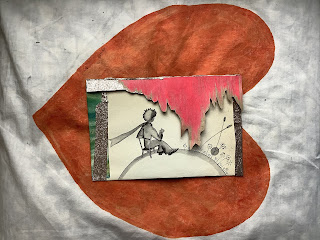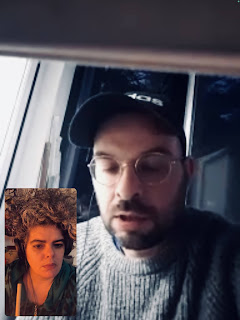A whole new talk
It's one year today, since my good friend (who says that his sentences may be really long but they make sense) and I started to be in touch more closely again; at times very often, normally now and then, always with some sort of intimacy. That hasn't been easy to find elsewhere, to say the least. We've met decades ago and even lived together for a while as university students - we know each other well - but it had been a while since we were this close. We reconnected a couple of years ago (and had a blast too, last time he was in Berlin), but it was the first Covid-19 lockdown that really got us to care about each other this much. Or at least to actually make the time to make the caring happen. This would be the case in any ideal community, be it of friends, colleagues or neighbours, but I keep looking around and what I see in the midst of a global physical isolation are overwhelmed families further closing themselves off. Single individuals don't feel much approachable in their total social isolation either. It has been polarizing as everything else in our societies: the ones with too much job related tasks and family obligations struggling to breathe and the ones with no job or social interactions at all struggling against pure loneliness and perhaps some lack of purpose too. Good intentions and solidarity apart, the ones reaching out alike, they are also facing difficulties with putting themselves in someone else's shoes.
What is it, that really made it so hard to us all to keep the ties and complicities alive throughout these past 12 months? To maintain basic real communication even? Should I keep blaming social media’s sick habits of exchange? Fake availability and time consumption culture? One could say that it was the strangeness of it all, initially there was not a single proper way to react to the pandemic for a while, there were too many conflicts and too little debate about how to react. Each one of us needed the time to adjust and to work out the grieving. It was the burying of a lifestyle that we all had to deal with. And then we had to adapt to each others' new needs and offers... which is not working that brilliantly, is it? Speaking for myself, the social desert that remained is suffocating. It's not the partying, travelling, eating out with friends that I most miss, or even attending concerts and shows of any kind, but the collective taking care of projects and thoughts, which implies investing time and having patience with each other. Being spontaneous too. That is, nothing that the pandemic could deny us, if only there would be a persisting will to feed one's community now and then before all radically individual needs. It is, in my opinion, as important to a healthy existence as the daily efforts to get economical support, self hygiene or family obligations done - to take care of the community [ies] one is part of.
What is it? I think that is a global blindness refusing to even consider change. A global insistence on going back to whatever we were together before Covid-19. Sometimes I think that the more overwhelmed people are, the less they want to even talk about it. That’s what normally happens if you are in shock, no surprise there, you just keep getting busy and engaging in your chosen obligations. But I still don’t get it after all this time struggling, because “before” was already no good at all for most people, animals, plants or the planet itself. That became very much visible and I am talking from an absolute privileged perspective being white (at least where I come from), European, born into a middle class family and living in Germany. Why wouldn’t most people be willing to change and to vehemently demand it from governments, corporations and each other too? Is it lethargy caused by collective depression? Fear? Or the results of a new level of massive consumerism/parallel misery? Maybe it’s just toxic positivity reaching a dead-end. I am afraid that maybe nothing significant will ever change for better.
This feeling of frustration for feeling lonely among so many people, which is also an aspect of not belonging anywhere, was obviously already in me before this all started, but half disguised in endless distractions and obligations (that were completely stripped of many of us so suddenly). I think we can all agree, that this pandemic brought into light many fragilities of contemporary life, at least in big cities. I am a bit mad still, that I haven't perceived the superficial bonds that kept us all together for so long as such. And I haven't been wanting more of it for now. That really is a personal tragedy: it was never my wish to become a kind of hermit. Not since I was growing up feeling lonely inside a family structure, like everyone else. I remember asking myself why wouldn't grown-ups meet friends more regularly and promising myself to do differently. I remember this thought to be of great importance to me.
It would be unfair not to mention that there have been some attempts from different people to care about me since day one of this pandemic. Not so many to care about us and them though, which is very hard for me to explain without sounding ungrateful. I am still trying to. But what if I can't find a way to socialize or to discuss ideas the way I used to with most of them? What if I keep feeling that we don't really know how to talk from an intimate level and mostly to listen with honesty? To find common ground where to meet? What if my perception is that of being inside a soap bubble, unable to penetrate those of others without dissolving? What remains is the impossibility of reaching the same layer. There is really not much interest in each other's ways of being now, to put it in a simplistic way. In the same way, we didn't stop needing each other. I really wish for my will to share the lighter parts to come back eventually, some days I doubt I will ever be able to again.
As for my good friend and I: he lives thousands of miles away and we have been missing the needed privacy for our exchanges to thrive, as we both live in tiny houses together with our now jobless partners. None of us has kids, but we do have family and economic obligations, worries and pressures, like any other person with more or less support. None the less, we cared to find a way to meet, either to discuss and produce art, talk politics or banalities, as to share deep concerns and superficial interests. We created new rituals and we maintain a regularity... none of us has been specially happy or productive lately, but I am truly joyful for our shared bakery projects and reactions to new Eurovision entries. It has been very good. A consolation - this is a word which meaning I had to recently reflect on due to my collaboration with a kid I'm teaching Portuguese to. He has a problem with memorizing the verb consolar (to console, oneself or someone else) that kept appearing in the famous "Little Prince" by Antoine de Saint-Exupéry (1943), that we finished reading today. It is only human, to crave solace from someone or something. For the little prince it was the sunset, for me beauty does it too.
This book, that I had taken for a strange kids' book with too many opportunities for pretty quotes with cool illustrations on t-shirts, bags and social media posts, revealed itself to be a really comforting reading presently. It's actually more a rite of passage after childhood than youth literature. It has to be reread as an adult. To have done it now, while also discussing it with a teenager, during the pandemic we don't see an obvious end to, was a lot about acceptance: that of our own mortality and of what remains at the end, what is universally essencial and too often forgotten. And that is the investment that we put into caring for something or someone (spoiler: that is what makes them special and irreplaceable). The material of which good memories are made of.
March 2020
March 2021
Para o Pedro. Obrigada pelo tempo,
and also for being silly with me,
but mainly for being there.
















Comments
Post a Comment